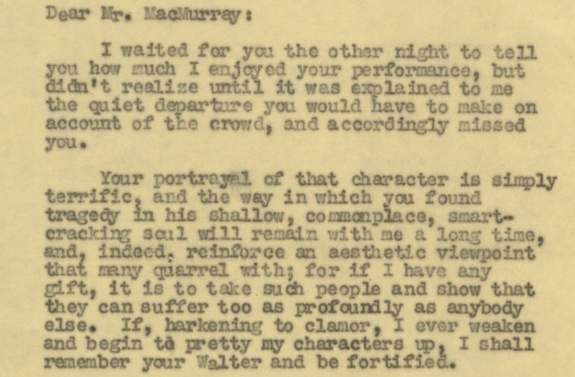It was a real treat to watch Double Indemnity (1944) again, not having seen it in years. Directed by Billy Wilder and based on the novella of the same name by James M. Cain, Double Indemnity is generally regarded as the first true film noir, setting the standard for other noirs that followed (it's the first noir to have "venetian blind" lighting and voice-over narration). For those not familiar with the story, it's about an insurance salesman who is seduced by a housewife into murdering her husband. The murder is made to look like an accident in order to collect the insurance money (to collect twice the amount in fact, thanks to a double indemnity clause in the policy). James Cain's novella was adapted for the screen by Billy Wilder and crime author Raymond Chandler who, despite disliking each other and having great difficulty working together, delivered a superb screenplay with razor-sharp dialogue.
Fred MacMurray had the same qualms about accepting the role as Stanwyck. Until then he had only played nice guys in lighter fare and was not at all eager to play a killer. Other actors before MacMurray had rejected the part, including Alan Ladd and George Raft, the latter because the film had no "lapel moment" (i.e. the moment where the male lead would flip over his lapel and reveal his police or FBI badge). As he had Barbara, Billy Wilder eventually persuaded MacMurray to accept the role, reportedly pestering the actor every day until he gave in. MacMurray never regretted his decision to play Walter Neff and later even stated that it was his best role.
 |
| Fred MacMurray with the inimitable Edward G. Robinson who plays clever insurance investigator Barton Keyes. |
James Cain, who had created Walter Neff, was impressed with MacMurray's handling of the character. In early 1944, the author attended the Los Angeles premiere of Double Indemnity and wanted to tell MacMurray how much he had liked his performance. MacMurray had left the event early, however, so Cain didn't have the opportunity to tell him in person. A letter being the next best thing, Cain wrote to MacMurray on 4 February 1944. Five days later, MacMurray answered Cain's letter, telling the author about his initial reluctance to accept the role, while also expressing his hope to play another Cain character in the future (which ultimately never happened).
 |
| A fragment of MacMurray's letter |
Source of both letters: Library of Congress Blogs
.jpg) |
| Cain (left) and MacMurray |
Double Indemnity was nominated for seven Academy Awards (including nominations for Best Picture, Best Director, Best Actress and Best Screenplay) but won none. Still, the film was a big success, both with critics and audiences. James Cain himself reportedly saw the film several times and once said: "It's the only picture I ever saw made from my books that had things in it I wish I had thought of."
Another Double Indemnity fan was author Charles Jackson who, shortly after viewing it, wrote the following letter full of praise to Billy Wilder. Jackson was the author of the bestselling novel The Lost Weekend (1944), which Wilder would make into a successful film a year later. While Double Indemnity came away empty-handed at the Oscars, The Lost Weekend would win four Oscars, including Best Picture and Best Director.
.jpg) |
| Source: icollector.com |



.jpg)


.jpg)
No comments:
Post a Comment